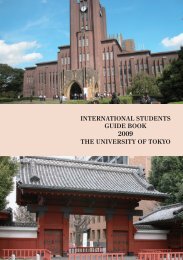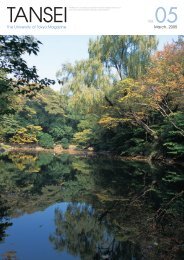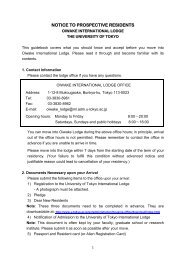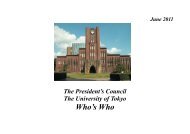brochure
brochure
brochure
Create successful ePaper yourself
Turn your PDF publications into a flip-book with our unique Google optimized e-Paper software.
• Microeconomics Workshop: Seminars by invited speakers,<br />
faculty members and graduate students on recent research topics<br />
in microeconomic theory and applications.<br />
• Macroeconomics Workshop: The University of Tokyo macroeconomics<br />
workshop is the leading forum for economics research<br />
in Japan. In the past year we have hosted over 40 seminars on<br />
a broad range of topics including macroeconomics, money and<br />
banking, development, public finance, industrial organization,<br />
finance, and labor economics.<br />
• Economic History of Contemporary Japan: The goal of the<br />
course is to understand economic development of Japan from<br />
the Tokugawa period, through the Meiji Restoration in the 1860s-<br />
Graduate School of<br />
Arts and Sciences<br />
Graduate Program<br />
on Global Society (GSP) Master’s/Doctorate<br />
70s, the industrial revolution in the 1880s-1890s and fast growth<br />
period in the 1960s, to the financial reform in the 1990s.<br />
• Money and Banking: Lectures on theoretical and empirical aspects<br />
of monetary policy and related topics on money and banking.<br />
• Various Topics courses: Topics in Economic Theory, Econometrics,<br />
Industrial Economics, Contemporary Japanese Economy and Finance.<br />
3-8-1 Komaba Meguro-ku, Tokyo, 153-8902 JAPAN<br />
PEAK/GPEAK Section, Academic Affairs Division:<br />
+81-3-5465-8220,<br />
g30grad@adm.c.u-tokyo.ac.jp<br />
http://gsp.c.u-tokyo.ac.jp/<br />
Degree Programs Offered in English<br />
The Graduate School of Arts and Sciences, which is located on the<br />
Komaba Campus and whose educational organization is integrated<br />
with the College of Arts and Sciences, will launch a new Graduate<br />
Program on Global Society (GSP). This Program will focus on<br />
the theme of human existence in the age of globalization and seek<br />
to provide agenda-shaping and problem-solving leadership for a<br />
multipolar world.<br />
New trends in technology and globalization require us to assume<br />
fresh perspectives, and to reconsider the political, social,<br />
ecological, cultural and ethical dimensions of the human condition.<br />
The GSP will offer innovative, highly relevant and in-depth<br />
approaches to the challenges and possibilities of a globalized civil<br />
society. It will enable the development of innovative forms of global<br />
governance and law to address unprecedented global issues.<br />
In responding to these global challenges, GSP will establish<br />
a cohesive and cutting edge program based on critical thinking,<br />
creative spirit, and practical activities for students in the<br />
Humanities and Social Sciences. Furthermore, the program will<br />
focus on modern Japanese and Asian societies and their unique<br />
experiences of Western modernity. The Program will place these<br />
experiences into a wider comparative and contextual order to<br />
shed light on the diversity and interdependency of a global<br />
society.<br />
English will be the working language of this Program. However,<br />
instruction may vary according to individual courses and interests.<br />
All courses offered in GSP are also open to English-speaking<br />
students affiliated with the Graduate Program on Human Security<br />
(HSP) and Graduate Program on Global Humanities (GHP). In<br />
addition, student groups and university-organized extra-curricular<br />
activities, such as internships and externships, will be included to<br />
allow increased social, cultural and scholarly exchange. Furthermore,<br />
GSP students will have access to courses in other graduate<br />
schools, both English-based and, in accordance with language<br />
competency, Japanese-based.<br />
Graduate Program<br />
on Environmental Sciences (GPES) Master’s/Doctorate<br />
http://gpes.c.u-tokyo.ac.jp/<br />
The Graduate School of Arts and Sciences, which is located on the<br />
Komaba Campus and whose educational organization is integrated<br />
with the College of Arts and Sciences, will launch the following<br />
interdisciplinary graduate program, utilizing the educational and<br />
research assets of the University of Tokyo’s Komaba Campus. It<br />
will not be an isolated program for international students but will<br />
be managed with the cooperation of other graduate courses and<br />
programs of the Graduate School of Arts and Sciences.<br />
The Graduate Program on Environmental Sciences (GPES) is<br />
the advanced version of the undergraduate program, PEAK, in<br />
the College of Arts and Sciences. However, graduation from the<br />
undergraduate program is not a prerequisite for admission to this<br />
graduate program and graduate students from other institutions are<br />
welcome. GPES offers a more specialized curriculum in the natural<br />
and social sciences and in engineering, including advanced studies<br />
on such themes as follows:<br />
(1) “philosophy” of the global system, including new approaches in<br />
international politics and economics<br />
(2) policies for simultaneous promotion of economic growth and<br />
environmental conservation<br />
(3) comprehensive understanding of the global climate, material<br />
cycles and energies<br />
(4) new methods for exploitation of solar and other renewable<br />
energy<br />
(5) biodiversity of the ecosystem from the perspective of ecology,<br />
evolutionary biology and environmental chemistry<br />
(6) data analysis including statistics and computer simulation<br />
(7) global sustainability approached from agro-economics and<br />
environmental economics.<br />
Students will acquire professional knowledge and problem-solving<br />
skills to pursue environmental and social sustainability that has<br />
become an urgent goal in the 21st century. Students are strongly<br />
encouraged to strengthen their Japanese language ability, which<br />
also may help them work in Japan after their graduation.<br />
54









